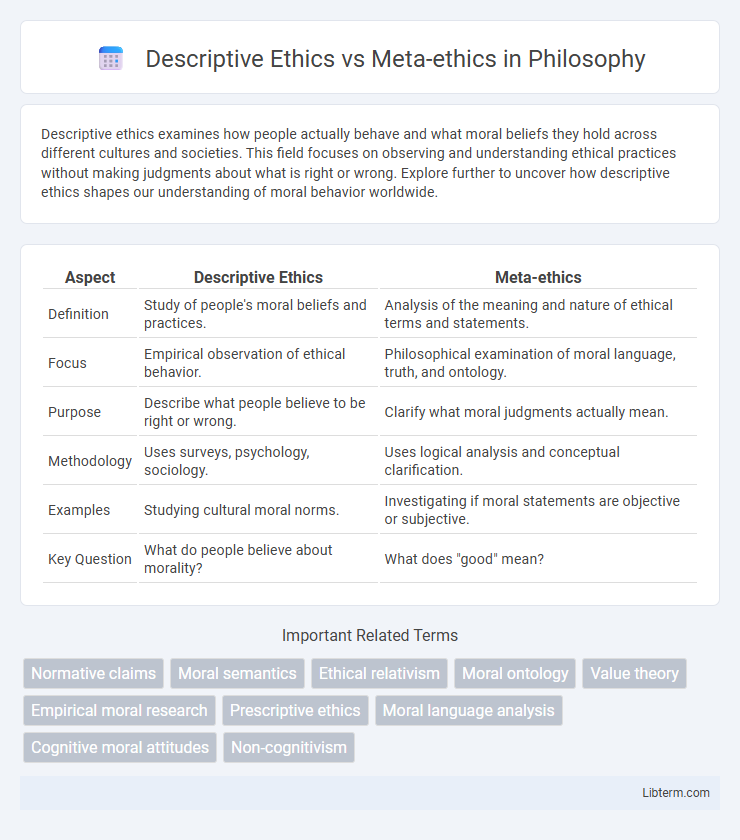Descriptive ethics examines how people actually behave and what moral beliefs they hold across different cultures and societies. This field focuses on observing and understanding ethical practices without making judgments about what is right or wrong. Explore further to uncover how descriptive ethics shapes our understanding of moral behavior worldwide.
Table of Comparison
| Aspect | Descriptive Ethics | Meta-ethics |
|---|---|---|
| Definition | Study of people's moral beliefs and practices. | Analysis of the meaning and nature of ethical terms and statements. |
| Focus | Empirical observation of ethical behavior. | Philosophical examination of moral language, truth, and ontology. |
| Purpose | Describe what people believe to be right or wrong. | Clarify what moral judgments actually mean. |
| Methodology | Uses surveys, psychology, sociology. | Uses logical analysis and conceptual clarification. |
| Examples | Studying cultural moral norms. | Investigating if moral statements are objective or subjective. |
| Key Question | What do people believe about morality? | What does "good" mean? |
Introduction to Ethics
Descriptive ethics examines how people actually behave and what moral beliefs they hold, providing empirical data about ethical practices across cultures. In contrast, meta-ethics explores the nature, origins, and meaning of ethical concepts, analyzing questions about what morality itself entails. Understanding these distinctions is fundamental in the introduction to ethics, as it clarifies the difference between observing moral behavior and questioning the essence of morality.
Defining Descriptive Ethics
Descriptive ethics examines how people actually behave and what moral standards they follow in various cultures and societies, focusing on empirical observation rather than normative judgment. It involves collecting data about ethical beliefs, practices, and values without prescribing what is right or wrong. This field contrasts with meta-ethics, which analyzes the nature, meaning, and foundations of ethical concepts themselves.
Defining Meta-ethics
Meta-ethics explores the nature, origin, and meaning of ethical concepts, addressing questions about what morality itself is rather than what actions are right or wrong. It analyzes the semantics and metaphysics of moral language, examining whether ethical statements express objective truths or subjective attitudes. Descriptive ethics, in contrast, focuses on observing and describing people's actual moral beliefs and practices without making normative judgments.
Key Differences Between Descriptive Ethics and Meta-ethics
Descriptive ethics examines how people actually behave and what moral beliefs they hold, relying on empirical observation and sociological data. Meta-ethics explores the nature, origin, and meaning of ethical concepts, analyzing the semantics, ontology, and epistemology of morality without making moral judgments. The key difference lies in descriptive ethics focusing on the factual description of moral practices, whereas meta-ethics investigates the underlying theoretical foundations of those moral concepts.
Methods Used in Descriptive Ethics
Descriptive ethics employs empirical methods such as surveys, interviews, and observational studies to gather data on people's moral beliefs and behaviors across cultures and societies. These methods aim to objectively document how individuals and groups actually reason about ethical issues without making normative judgments. By analyzing patterns in moral practices, descriptive ethics provides a foundation for understanding ethical diversity and informing comparative moral philosophy.
Philosophical Approaches in Meta-ethics
Meta-ethics explores the nature, origin, and meaning of ethical concepts, focusing on questions about moral truth, objectivity, and language. Philosophical approaches in meta-ethics include moral realism, which asserts that moral facts exist independently of human beliefs, and moral anti-realism, which denies such objective moral truths. Other key approaches encompass expressivism, emphasizing the emotional or attitudinal character of moral statements, and error theory, which contends that all moral claims are false due to the non-existence of moral properties.
Importance of Descriptive Ethics in Society
Descriptive ethics provides a vital framework for understanding the moral beliefs and behaviors that prevail within different cultures and societies, enabling sociologists and anthropologists to document ethical diversity without making normative judgments. By analyzing how communities define right and wrong, descriptive ethics helps policymakers craft culturally sensitive laws and social programs that reflect the values of the population. This approach also facilitates dialogue and conflict resolution by revealing the underlying assumptions and moral principles that guide human conduct across various social groups.
Theoretical Relevance of Meta-ethics
Meta-ethics explores the foundational nature, meaning, and origin of ethical concepts, providing theoretical relevance by clarifying whether moral values are objective, subjective, or culturally dependent. It examines the language, truth conditions, and epistemology of moral judgments, enabling a deeper understanding of ethical discourse beyond the empirical observations typical of descriptive ethics. This theoretical insight guides ethical inquiry by framing how moral statements can be interpreted, justified, or critiqued within philosophical and practical contexts.
Common Debates in Both Fields
Common debates in descriptive ethics revolve around how cultural norms and societal behaviors influence moral judgments, while meta-ethics focuses on the nature, origin, and meaning of ethical concepts. Discussions in both fields often address the objectivity of moral values, with descriptive ethics analyzing empirical moral practices and meta-ethics exploring whether moral statements express factual truths or subjective opinions. The distinction between moral relativism and moral realism remains a central tension, influencing debates on how ethical knowledge can be validated and understood across different cultures and philosophical perspectives.
Conclusion: Integrating Descriptive Ethics and Meta-ethics
Integrating descriptive ethics and meta-ethics enhances understanding of moral phenomena by combining empirical observations of ethical beliefs with analysis of their meaning and justification. Descriptive ethics provides data on how people actually behave, while meta-ethics evaluates the nature of moral language and concepts, creating a comprehensive framework. This synthesis supports more nuanced ethical inquiries and grounded normative theories.
Descriptive Ethics Infographic

 libterm.com
libterm.com